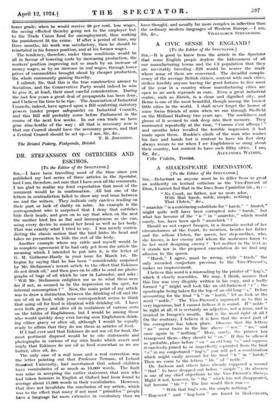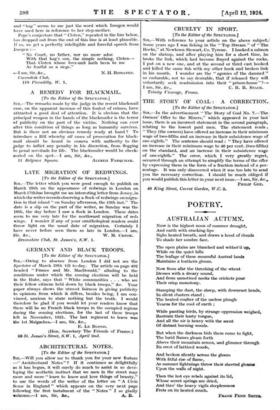A SHAKESPEARE EMENDATION.
• [To the Editor of the SPECTATOR.] SIR,—Reluctant as anyone must be to differ from so great an authority on textual criticism as the Vice-Provost of Eton, I cannot feel that in the lines from Cymbeline (iii., 4) :- " No Court, no father, nor no more adoe, With that harsh, noble, simple, nothing : That Cloten," &c., " anarchic " is a convincing substitute for " harsh." " Anarch might quite well have been corrupted into " harsh," but what has become of the " is " in " anarchic," which would surely, too, have been spelt " anarchick " ?
Should we not expect Imogen, in a dramatic recital of her circumstances at the Court, to mention, besides her father and the odious Cloten, the queen, her step-mother, who, she knows, is her enemy and whom the audiences know to be her most designing enemy ? Yet neither in the text as it stands nor in the proposed emendation do we find any allusion to the queen.
" Harsh," I agree, must be wrong, while " trash," the only recorded conjecture previous to the Vice-Provost's, makes no improvement.
I believe this word is a misreading by the printer of " hag's," which it closely resembles. We may, I think, assume that this line was very illegibly written in his copy, and a badly formed "g" might well look like an old-fashioned " r " ; the apostrophe being taken for the top of an old long s." Before accounting for the final " h " in " harsh," let us look at the word " noble." The Vice-Provost's argument as to this is very ingenious, but I cannot believe it is sound. If " noble " be right at all, it is certainly an adjective, not a noun, and is ironical in Imogen's mouth. But is the word right at all ? On the contrary, I believe it is here that the worst part of the corruption has taken place. Observe that the letters " no " occur twice in the line above—" nor," " no," and once again in " nothing." Here, surely, the printer has transposed them—they should be " on." If this be allowed as probable, place before " on " an old long "s," and suppose it carelessly. joined to or imperfectly separated from the final "s" in my conjectured "hag's," you will get a combination which might easily account for the final " h " in " harsh." Then we come to the letters " ble " of " noble."
Dr. Jackson and others have already supposed a second " that " to have dropped out before " simple " : its absence is one of my chief objections to the Vice-Provost's theory. Might it not, however, be " the " which has not disappeared, but become " ble " ? The line would then run :- " With that hag's son, the simple nothing." ‘! Hag-seed " and " hag-born " are found in Shakespeare, and " hag " seems to me just the word which Imogen would have used here in reference to her step-mother.
Pope's conjecture that " Cloten," repeated in the line below, has dropped out from the end of this line is at least plausible. If so, we get a perfectly intelligible and forceful speech from Imogen :— " No Court, no father, nor no more adoe With that hag's son, the simple nothing, Cloten-- That Cloten whose love-suit hath been to me As fearful as a siege."
Cavendish Club, 119 Piccadilly, W. 1.











































 Previous page
Previous page